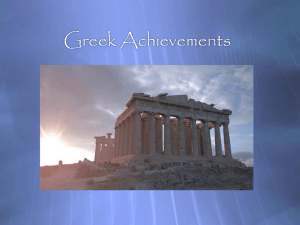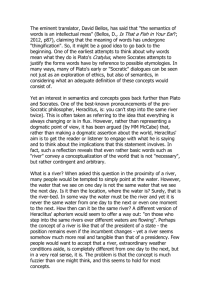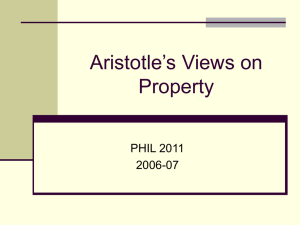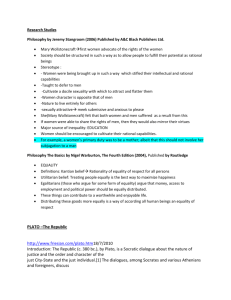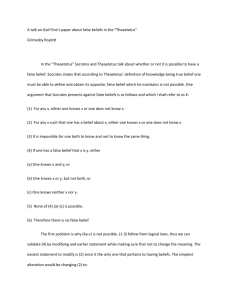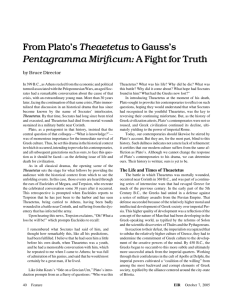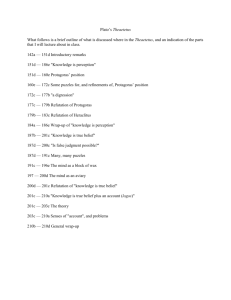Killing Time: The Philosopher`s Leisure in Plato`s Theaetetus At the
advertisement
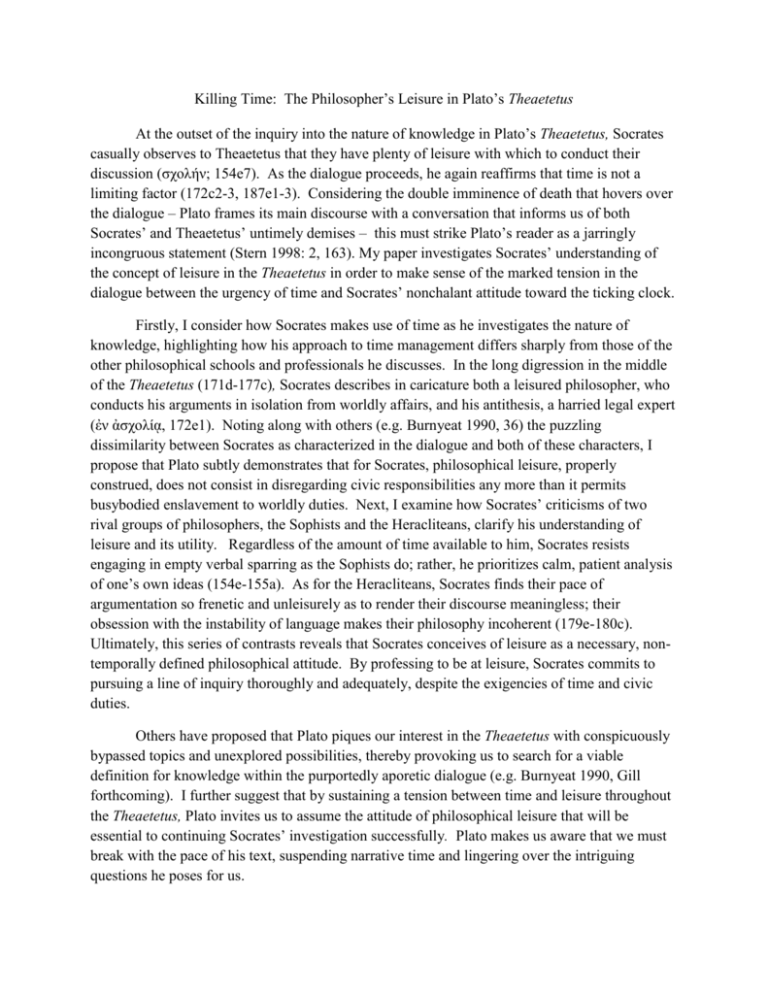
Killing Time: The Philosopher’s Leisure in Plato’s Theaetetus At the outset of the inquiry into the nature of knowledge in Plato’s Theaetetus, Socrates casually observes to Theaetetus that they have plenty of leisure with which to conduct their discussion (σχολήν; 154e7). As the dialogue proceeds, he again reaffirms that time is not a limiting factor (172c2-3, 187e1-3). Considering the double imminence of death that hovers over the dialogue – Plato frames its main discourse with a conversation that informs us of both Socrates’ and Theaetetus’ untimely demises – this must strike Plato’s reader as a jarringly incongruous statement (Stern 1998: 2, 163). My paper investigates Socrates’ understanding of the concept of leisure in the Theaetetus in order to make sense of the marked tension in the dialogue between the urgency of time and Socrates’ nonchalant attitude toward the ticking clock. Firstly, I consider how Socrates makes use of time as he investigates the nature of knowledge, highlighting how his approach to time management differs sharply from those of the other philosophical schools and professionals he discusses. In the long digression in the middle of the Theaetetus (171d-177c), Socrates describes in caricature both a leisured philosopher, who conducts his arguments in isolation from worldly affairs, and his antithesis, a harried legal expert (ἐν ἀσχολίᾳ, 172e1). Noting along with others (e.g. Burnyeat 1990, 36) the puzzling dissimilarity between Socrates as characterized in the dialogue and both of these characters, I propose that Plato subtly demonstrates that for Socrates, philosophical leisure, properly construed, does not consist in disregarding civic responsibilities any more than it permits busybodied enslavement to worldly duties. Next, I examine how Socrates’ criticisms of two rival groups of philosophers, the Sophists and the Heracliteans, clarify his understanding of leisure and its utility. Regardless of the amount of time available to him, Socrates resists engaging in empty verbal sparring as the Sophists do; rather, he prioritizes calm, patient analysis of one’s own ideas (154e-155a). As for the Heracliteans, Socrates finds their pace of argumentation so frenetic and unleisurely as to render their discourse meaningless; their obsession with the instability of language makes their philosophy incoherent (179e-180c). Ultimately, this series of contrasts reveals that Socrates conceives of leisure as a necessary, nontemporally defined philosophical attitude. By professing to be at leisure, Socrates commits to pursuing a line of inquiry thoroughly and adequately, despite the exigencies of time and civic duties. Others have proposed that Plato piques our interest in the Theaetetus with conspicuously bypassed topics and unexplored possibilities, thereby provoking us to search for a viable definition for knowledge within the purportedly aporetic dialogue (e.g. Burnyeat 1990, Gill forthcoming). I further suggest that by sustaining a tension between time and leisure throughout the Theaetetus, Plato invites us to assume the attitude of philosophical leisure that will be essential to continuing Socrates’ investigation successfully. Plato makes us aware that we must break with the pace of his text, suspending narrative time and lingering over the intriguing questions he poses for us. Bibliography Blondell, R. The Play of Character in Plato’s Dialogues. Cambridge, 2008. Burnyeat, M., and M.J. Levett. The Theaetetus of Plato. Indianapolis: Hackett, 1990. Gill, M.L. Philosophos: Plato’s Missing Dialogue. Oxford: forthcoming 2012. Harrison, J. “Plato’s Prologue: Theaetetus 142a-143c,” Tulane Studies in Philosophy 27 (1978) 103-23. Hemmenway, S. “Philosophical Apology in the Theaetetus,” Interpretation 17 (1990): 323-46. Johnson, W.A. “Dramatic Frame and Philosophic Idea in Plato,” The American Journal of Philosophy 119.4 (1998) 577-98. McCoy, M. Plato on the Rhetoric of Philosophers and Sophists. Cambridge, 2008. Nails, D. The People of Plato: A Prosopography of Plato and Other Socratics. Indianapolis: Hackett, 2002. Stern, P. Knowledge and Politics and Plato’s Theaetetus. Cambridge, 2008. Tschemplik, A. Knowledge and Self-Knowledge in Plato’s Theaetetus. New York: Lexington Books, 2008.


